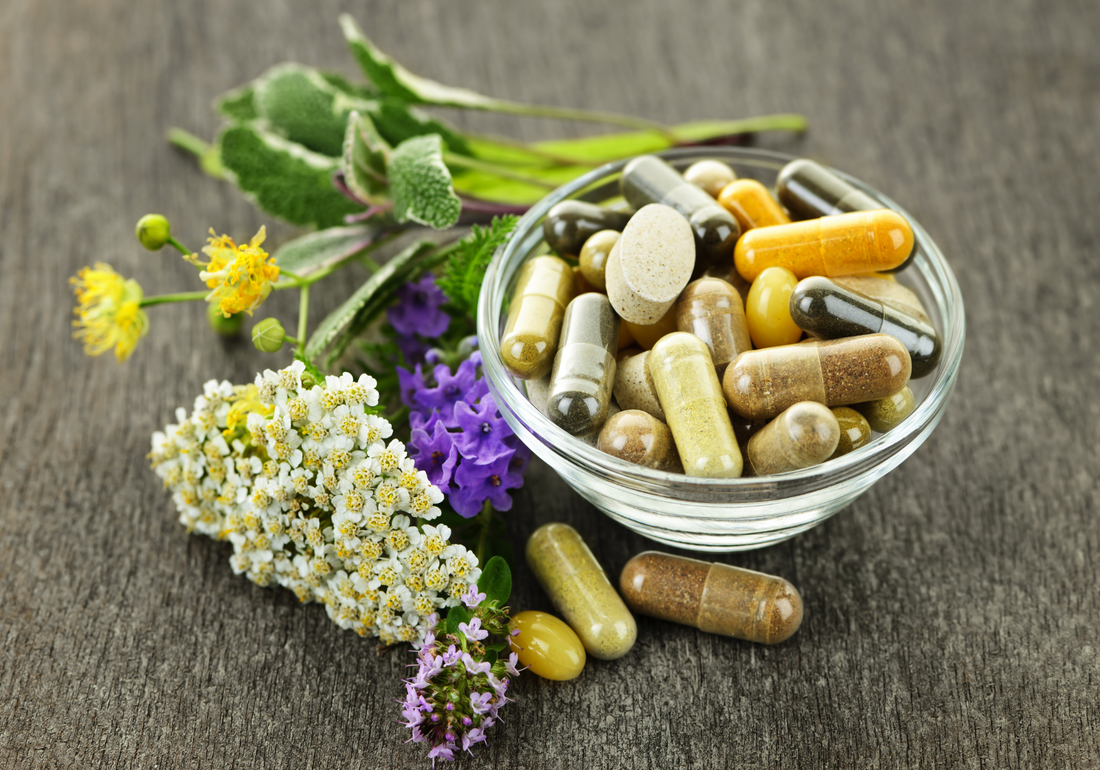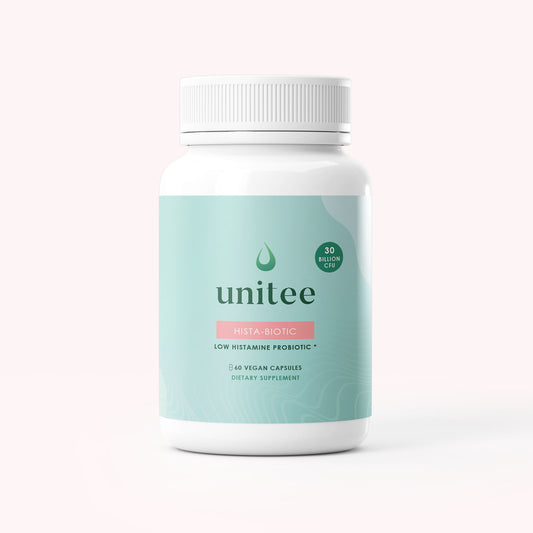Trying to find supplements for histamine intolerance that actually work? I've got you!
Today, I'll tell you about the 7 best supplements for histamine intolerance that are all-natural and scientifically proven to ease your symptoms.
Let's get started.
What's happening with histamine intolerance?
They are one of the good guys in the complex cocktail that make up your body’s immune system – helping you gear up to fight a bad flu or infection. Yes, we’re talking about histamines – those ‘bonafide hustlers’ who make you itch, swell or even erupt in red patches, whatever it takes to get the bad boys out of your system asap.
Unfortunately, sometimes, an excessive amount of histamines can make your body react like a bouncer who keeps out even the invited guests to the party - causing your body to respond violently to what are otherwise harmless triggers. If you have ever wiped a bookshelf covered in dust only to start sneezing violently, or eaten high histamine foods that don't cooperate with your system and broken into a bout of rashes, you'll know what I'm talking about.
As you must know if you are a regular reader to this blog, I believe the right food choices can prevent a whole lot of health conditions and imbalances in the body, and histamine intolerance is no different. A balanced diet with low histamine foods can certainly help reduce symptoms of histamine intolerance. However, to kick start your maladjusted immune system, here are some tried and tested supplements for histamine intolerance that will help you bid goodbye to your histamine intolerance symptoms and say hello to an easier daily life.
Each of these supplements for histamine intolerance was carefully selected through research. They have been tried and tested for their efficacy in histamine intolerance, and are backed by numerous scientific studies which I've cited throughout.
Along with a nutritious, low histamine diet, the right supplements for histamine intolerance can go a long way in alleviating symptoms. Be sure to use a combination of my free low histamine diet, along with the supplement recommendations.
As a histamine intolerance expert, here are my top supplement recommendations to help you say goodbye to the itches, sniffles and other body-wide symptoms that come along with with histamine intolerance.
7 Best Histamine Intolerance Supplements
1. Low histamine probiotics
It should be a more wide-spread word of caution that when selecting supplements for histamine intolerance, probiotics are one of the most important to pay attention to. It is absolutely essential that care is taken to choose the right strains, as the wrong combination of bacteria can actually aggravate symptoms!
This is because many “beneficial” bacteria actually produce histamine. This production is natural and, in a healthy, non-histamine-intolerant individual, the body will degrade this histamine easily.
However, in a histamine intolerant individual, it’s important to ensure you’re not adding any histamine-producing bacteria into your system and, instead, balancing your microbiome using histamine-friendly probiotics.
In order to avoid aggravating symptoms, using a tailored, low-histamine probiotic would be the best starting supplement for histamine intolerance, as it will help to balance your gut bacteria using particular strains of probiotics that are histamine-friendly.
I use a low histamine probiotic that combines six non-dairy, stomach acid resistant strains of beneficial bacteria that are, most importantly, low histamine. These probiotics have proven effective effective in numerous studies [1-4]. My clients using a low histamine probiotic have seen great results through both oral and rectal administration via probiotic enemas.
For a more detailed explanation on selecting the perfect, histamine-friendly probiotic, check out this article I wrote on probiotics for histamine intolerance.
2. Vitamin C for histamine symptoms
Here's something you've probably heard from your mother before: a daily dose of Vitamin C can really help boost the body’s immune system. This notion doesn’t simply come from the wisdom of old wives’ tales - it’s corroborated by science.
Numerous studies have shown that intake of Vitamin C as a supplement for histamine intolerance can reduce the symptoms of histamine intolerance itself [5]. Additionally, Vitamin C is a powerful antioxidant and provides numerous additional benefits to the body, including preventing biological ageing which is associated with disease status later in life.
Keep in mind that citrus fruits, some of the highest common sources of vitamin C, are actually restricted on a low histamine diet, which may make meeting the daily requirement even harder. In this case, supplementation can be both practical and therapeutic.
3. Quercetin to stabilize mast cells
Quercetin, a plant pigment found in many proclaimed superfoods, has been shown to be an effective supplement for histamine intolerance by directly blocking the release of histamine from mast cells. Mast cells contain molecules called mediators (histamine is one such mediator) which are secreted when the cells are triggered.
Studies have shown quercetin to display both anti-inflammatory and anti viral properties. It works more effectively with a supplement which contains bromelain (a compound found in pineapples) as well [6].
4. Bromelain for histamine intolerance
Bromelain is a phytochemical compound found in high concentration in the stem of pineapples. In other words, it’s a common mistake that eating pineapple chunks will provide a sufficient source of this beneficial compound!Bromelain has been used in traditional medicine systems across the world for centuries and, recently, science has begun to dive into the evidence behind this "miracle compound".
According to studies, bromelain has shown to be effective in the treatment of numerous histamine-associated symptoms, while simultaneously improving absorption of certain compounds in the gut [6,7].
5. Stinging nettles for histamine symptoms
Stinging nettles, or Urtica dioica, has been shown to work better in blind tests than a placebo to reduce symptoms of histamine intolerance [8]. Let us see what happens behind the screen when the body ingests Urtica dioica…
Interestingly, the stinging hairs on the leaves of the species are rich in serotonin (5-hydroxytryptamine) and acetylcholine. Through the process of freeze-drying, Urtica dioica is able to preserve its anti-allergen properties and work similar to existing antihistamine supplements on the market.
A randomized, double-blind study using 300 mg freeze-dried Urtica dioica to treat patients with allergic rhinitis found that 69 of patients who participated in the study rated it as more effective than a placebo [9]. Another 58 percent felt it was effective in relieving their symptoms.
It's interesting that this treatment has been effective, despite the fact that the stinging hairs themselves contain histamine. The reason for this, is because histamine has the ability to work as a local regulator to modulate immune response, therefore resulting in reduced symptoms!

6. Anti-Hist: an all-natural antihistamine
Anti-Hist is a true superhero when it comes to supplements for histamine intolerance, as its compounds have all shown promising results in testing.
The all-natural supplement contains stinging nettles leaf, quercetin, bromelain and vitamin C, all of which have been demonstrated to be top superpowers for reducing histamine-associated symptoms [1-10].
In other words, Anti-Hist combines all of the best histamine-healing remedies into one single supplement of perfectly proportioned dosages for maximum symptom relief.
The compounds in Anti-Hist have been shown to be very effective in treating sinus allergies and common symptoms of histamine intolerance. Unlike over-the-counter medications, this natural supplement does not cause drowsiness and, has been reported by clients to start seeing noticeable improvements in as little as 10 days.
Anti-Hist is by far my #1 recommended supplement for histamine intolerant clients because they can actually feel the difference, rather than being unsure if it’s working or not. It has even been referred to by my clients as a “miracle in a bottle” and a “wonder-drug" - and, the way it allows my clients to eat more foods with fewer symptoms makes it clear why it's the most popular antihistamine supplement I've worked with.
7. Diamine oxidase (DAO) enzyme supplements
Diamine oxidase enzymes are responsible for degrading ingested histamine in the gut. This includes histamine consumed through food and environmental exposures.
Diamine oxidase is of particular importance as over 70% of individuals with histamine intolerance appear to have lower than normal levels of DAO enzymes. This statistic means that the majority of individuals experiencing histamine intolerance symptoms could benefit from using DAO enzyme supplements.
Using a DAO enzyme supplement often allows people to tolerate higher histamine foods and experience fewer symptoms, simply because the DAO enzymes are breaking down the histamine that is being consumed through food and environment.
This breakdown means a lower baseline level of histamine in the body, while simultaneously clearing histamine from the body faster. The overall result often means higher tolerance and fewer symptoms!
Antihistamine Supplements: Conclusion
Whichever supplements you choose to take, be sure that they are using high quality sources with clean ingredients - including the capsules - and are third party tested to ensure they contain all of the ingredients they claim to, in the therapeutic levels you need.
The same ingredient can really vary in quality and potency. Think for example about two apple pies: one is made with organic, homegrown, apples freshly picked from the garden. The other is made from mass-produced, inorganic apples that were slightly spoiled and didn't want to be thrown out. Which is going to be more nutritious and will make you feel better? I'm guessing the first pie!
The same really applies to supplements - they're extracted from plants. So, sourcing is really important and can make a world of difference between adding more junk into your body vs getting therapeutic levels of beneficial ingredients. Or, in other words, between feeling nothing vs a noticeable positive difference in your health.
FAQs: Best Histamine Intolerance Supplements
How can I know my supplements are high quality?
There are several factors that determine this. As mentioned above, one of the most important is third party testing, which is when an unbiased third party randomly tests capsules to ensure they contain exactly what the label says.
Additionally, ensuring a Good Manufacturing Practices (GMP) certification is present. As supplements are not a mandatorily regulated industry, a GMP certification means there has been regulation enforced by the FDA regarding the manufacturing, labeling and holding process.
Essentially, this difference in quality and production can be compared to eating an organic apple which is washed in a bacteria-free facility and stored in a cool, crisp and clean fridge - vs. eating an old moldy apple that's been stored under a dirty couch during the hot summer. I know which one my body would prefer!
Is it necessary to take histamine intolerance supplements?
No. Not everyone chooses to take supplements, and that's okay.
Supplements provide potent forms of powerful natural remedies in order to deliver therapeutic doses and speed up the healing process. For this reason, I prefer to use supplements as it makes the process much faster, takes a lot of the stress away and prevents further damage from being done to the body.
However, that's not to say you can't achieve great things with diet and lifestyle alone. The catch to this is, of course, there has to be an immense focus to ensure you are getting therapeutic doses of DAO enzyme increasing foods, antihistamine foods and other diet and lifestyle changes that help to manage and heal histamine intolerance, on top of implementing a low histamine diet.
For this reason, I prefer to simply use a low histamine diet alongside supplements.
If you want to opt for a minimal supplement routine, the top 3 histamine intolerance supplements I work with that make the biggest difference for my clients are low histamine probiotics, Anti-Hist, and a DAO enzyme supplement.
Are all of these histamine intolerance supplements vegan and vegetarian friendly?
The majority of them are vegan and/or vegetarian friendly. You can always check bottles and product pages to ensure this. The one supplement that is not vegan or vegetarian friendly is DAO enzyme supplement as it is extracted from porcine kidney. If you are strictly vegan or vegetarian, you should avoid this supplement.
Put your health in nature's hands.
Anita Tee, Nutritional Scientist
References
- Yang, P., Yang, G. and Liu, Z. (2013). Treatment of allergic rhinitis with probiotics: An alternative approach. North American Journal of Medical Sciences, 5(8), p.465. https://www.ncbi.nlm.nih.gov/pmc/articles/PMC3784923/
- Ishida, Y., Nakamura, F., Kanzato, H., Sawada, D., Hirata, H., Nishimura, A., Kajimoto, O. and Fujiwara, S. (2005). Clinical Effects of Lactobacillus acidophilus Strain L-92 on Perennial Allergic Rhinitis: A Double-Blind, Placebo-Controlled Study. Journal of Dairy Science, 88(2), pp.527-533. https://www.ncbi.nlm.nih.gov/pubmed/15653517/
- Kawase, M., He, F., Kubota, A., Hiramatsu, M., Saito, H., Ishii, T., Yasueda, H. and Akiyama, K. (2009). Effect of fermented milk prepared with two probiotic strains on Japanese cedar pollinosis in a double-blind placebo-controlled clinical study. International Journal of Food Microbiology, 128(3), pp.429-434. https://www.ncbi.nlm.nih.gov/pubmed/18977549
- Ouwehand, A., Nermes, M., Collado, M., Rautonen, N., Salminen, S. and Isolauri, E. (2009). Specific probiotics alleviate allergic rhinitis during the birch pollen season. World Journal of Gastroenterology, 15(26), p.3261. https://www.ncbi.nlm.nih.gov/pubmed/19598302
- Hemilä, H. (2014). The effect of vitamin C on bronchoconstriction and respiratory symptoms caused by exercise: a review and statistical analysis. Allergy, Asthma & Clinical Immunology, 10(1), p.58. https://www.ncbi.nlm.nih.gov/pmc/articles/PMC4363347/
- Pavan, R., Jain, S., Shraddha and Kumar, A. (2012). Properties and Therapeutic Application of Bromelain: A Review. Biotechnology Research International, 2012, pp.1-6 https://www.ncbi.nlm.nih.gov/pubmed/23304525
- Heinicke, R., Van der Wal, L. and Yokoyama, M. (1992). Effect of bromelain (Ananase) on human platelet aggregation. Experientia, 28(7), pp.844-5. https://www.ncbi.nlm.nih.gov/pubmed/4658882
- Li, Y., Yao, J., Han, C., Yang, J., Chaudhry, M., Wang, S., Liu, H. and Yin, Y. (2016). Quercetin, Inflammation and Immunity. Nutrients, 8(3), p.167. https://www.ncbi.nlm.nih.gov/pmc/articles/PMC4808895/
- Thornhill, S. and Kelly, A. (2000). Natural Treatment of Perennial Allergic Rhinitis. Alternative Medicine Review, 5(5), pp.448-454. https://www.altmedrev.com/publications/5/5/448.pdf
- Masini, E., Di Bello, M., Pistelli, A., Raspanti, S., Gambassi, F., Mugnai, L., Lupini, M. and Mannaioni, P. (1994). Generation of nitric oxide from nitrovasodilators modulates the release of histamine from mast cells. J Physiol Pharmacol., 45(1), pp.41-53. https://www.ncbi.nlm.nih.gov/pubmed/7519083

Anita Tee
My name is Anita Tee. I'm a nutritional scientist who specializes in histamine intolerance. I hold a Master of Science in Personalized Nutrition and a Bachelor of Science in Human Biology and Psychology.For the past ten years, I have used my experience in nutritional and medical health sciences to create a scientifically backed, natural approach to healthcare that relies 100% on evidence-based research.As I previously suffered from - and overcame - histamine intolerance, my focus is to increase recognition and expand the available resources and protocols available for resolving this particular disorder. To date, I have helped over 4,000 individuals fully resolve or better manage their histamine intolerance symptoms.









